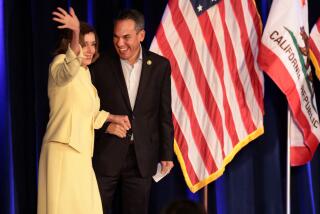She opened home to close a door
- Share via
WASHINGTON — Sen. Dianne Feinstein ended a very personal campaign when she welcomed Hillary Rodham Clinton and Barack Obama to her home Thursday for their first meeting since Obama wrapped up the Democratic presidential nomination.
In 1978, the San Francisco Democrat was among the first women to become mayor of a major American city. Fourteen years later, she and Barbara Boxer were elected as California’s first female U.S. senators. This year, she ardently hoped Clinton would become the first woman to claim the White House.
But Thursday at 9 p.m., it fell to Feinstein to help guide Clinton’s historic campaign to a close. “It’s a very hard loss,” Feinstein said Friday, reflecting on her bittersweet duty. “I wanted very much to see her succeed.”
Feinstein -- whose arrival in Washington coincided with President-elect Clinton’s -- has known Hillary Clinton for more than 15 years. Shortly after Feinstein moved to the capital, the Clintons invited her to the White House when she was alone on her birthday. Both Clintons campaigned frequently for her in California, although Feinstein at times broke with the White House on pieces of legislation -- and was infuriated by Bill Clinton’s lies about his affair with Monica S. Lewinsky.
When the former first lady was gearing up her presidential run last summer, Feinstein was among the first of her Senate colleagues to offer an endorsement, noting the pathbreaking nature of Clinton’s candidacy.
“The position of America today really warrants someone in her shoes, and the fact that her shoes maybe have an inch or two of heels doesn’t matter,” Feinstein told reporters when she announced her endorsement of the New York senator during a conference call in July.
Feinstein, who turns 75 this month, is 14 years older than Clinton. Both identify with the first generation of women who challenged barriers in politics and elsewhere.
“I have often felt that younger women don’t really think about what it was like,” Feinstein said. “People forget that we have had to fight for much of everything. . . . She has been part of that. She has gone through all of these women’s movements and matured through it, as I hope I have.”
Feinstein, who like Clinton voted to authorize the war in Iraq and clashed with the liberal wing of the party over that, campaigned beside Clinton as she fought to hold off Obama in California’s Feb. 5 primary.
“I tried to give her encouragement,” Feinstein said. “I tried to talk to her after several of the major debates, to tell her how she had done and just to say, ‘You looked great. You looked terrific.’ ”
After Obama’s Super Tuesday surge, Feinstein embraced Clinton on the floor of the Senate. And when Sen. Patrick J. Leahy (D-Vt.), an Obama backer, suggested in early March that Clinton should fold her tent, Feinstein publicly defended Clinton’s right to keep fighting.
By early May, however, Feinstein had begun to openly worry about the bitter tone of the primary battle.
After Obama extended his delegate lead by defeating Clinton handily in the North Carolina primary and narrowly losing Indiana, Feinstein said she wanted to talk to Clinton about her strategy. “I think the race is reaching the point where there are negative dividends from it, in terms of strife within the party,” she said at the time.
Later in May, Feinstein suggested that the two candidates should be on the same ticket.
This week, as Clinton’s apparent reluctance to leave the race increased the consternation of Democratic officials, Clinton talked with Feinstein about sitting down with Obama.
“She wanted something that was private. She said, ‘I can’t go anywhere,’ ” Feinstein said.
The California senator told Clinton that she would happily offer the privacy of her home, which sits behind a fence on a street with no parking in a leafy section of Washington. And Obama, Feinstein said Friday, “was very gracious. He said he would go wherever, wherever Sen. Clinton wanted.”
When the candidates arrived Thursday, “I received them, put them in the living room in two comfortable chairs facing one another” and went upstairs, said Feinstein. After about an hour, she said, Obama came out and said “Dianne, we’re finished.”
“I came down and said: ‘Good night, everybody. I hope you had a good meeting.’ They were both laughing, and that was it.”
Feinstein said Friday that Clinton conducted herself well in the campaign.
But 39 years after she was elected to the San Francisco Board of Supervisors, Feinstein said, women and men are still treated differently in politics. “Gender bias in this country,” she said with sadness in her voice, “is alive and well.”
--
More to Read
Sign up for Essential California
The most important California stories and recommendations in your inbox every morning.
You may occasionally receive promotional content from the Los Angeles Times.







